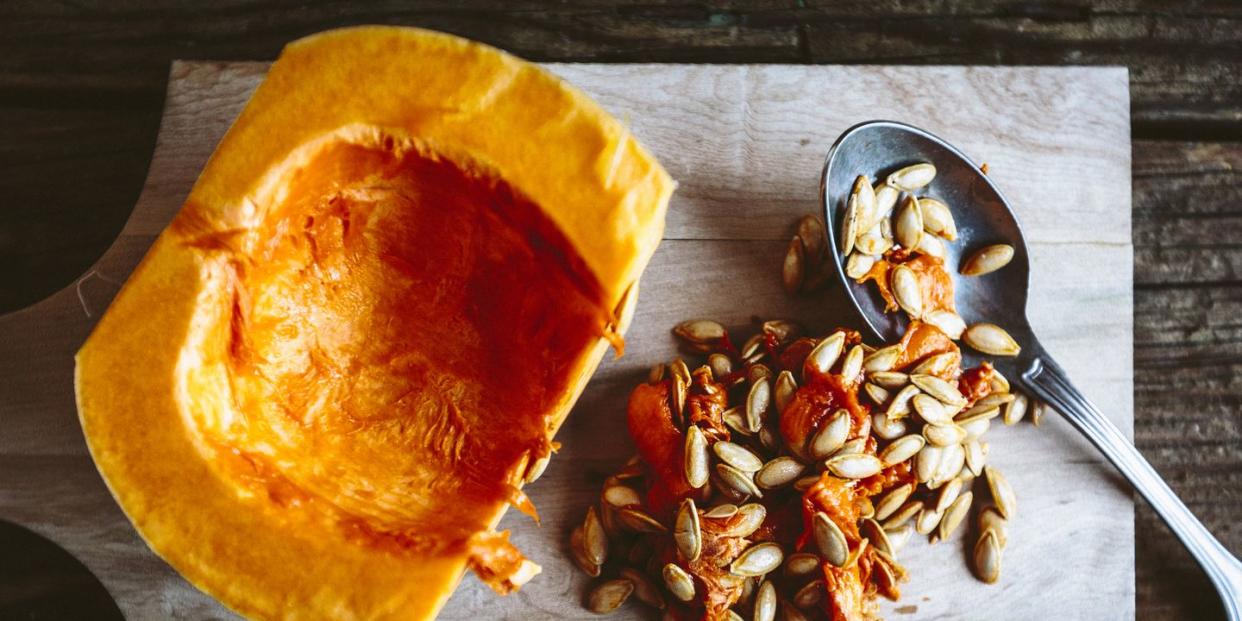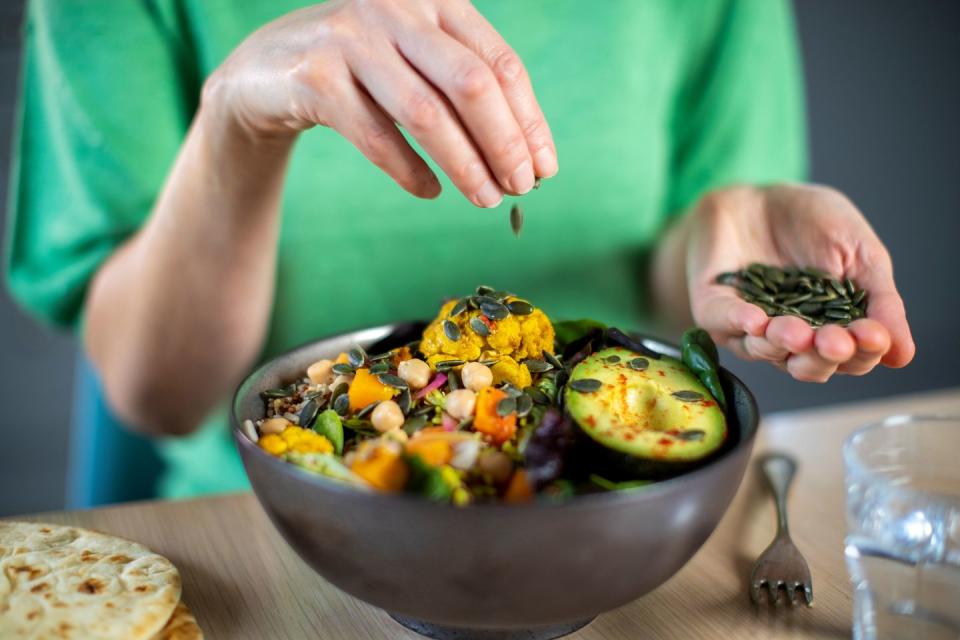12 benefits of pumpkin seeds

The benefits of pumpkin seeds make them a pantry staple. Whether stirred into porridge, sprinkled over salads, or roasted and enjoyed whole, they add texture and flavour, and are packed with vitamins, minerals, antioxidants, protein, healthy fats, and fibre.
Despite their small size, pumpkin seeds contain an impressive amount of omega-3, phosphorus and manganese, meaning these tiny seeds can help to reduce inflammation, support heart health, and regulate blood sugar levels.
We asked nutritionist Jenna Hope, and Rebecca Traylen, associate nutritionist and head of nutrition at Probio7, to talk us through the most healthful pumpkin seeds benefits:
1. A source of omega-3 fatty acids
Omega-3 fatty acids are a group of polyunsaturated fats that your body can’t make, so you must get them from your diet. Pumpkin seeds contain small amounts of ALA (alpha-linolenic acid), a type of fatty acid most commonly found in plant foods. ‘ALA is converted into the active form of omega-3 in the body, which plays an important role in supporting cell structure, reducing inflammation and cell signalling through the production of eicosanoids,’ Hope says.
2. Full of vitamins and minerals
Pumpkin seeds are especially rich sources of phosphorus and manganese, containing between 35 and 40 per cent of your recommended daily amount (RDA) per 30 gram serving. Rather impressive for a seed! They’re also high in vitamin K, iron, zinc, copper, vitamin B2, vitamin B9 and potassium. ‘Due to their high nutrient content, pumpkin seeds have many health benefits and can be included as part of a healthy balanced diet,’ says Traylen.
3. Rich in fibre
Packing 5g of fibre per 30g serving, pumpkin seeds are a solid choice to help you reach your recommended daily 30g target. ‘Fibre is essential for maintaining healthy bowel movements and feeding the gut microbiome to support a healthy gut profile,’ says Hope. A high-fibre diet regulates your blood sugar, keeps your cholesterol levels low, and can even reduce your risk of coronary heart disease, stroke, type 2 diabetes and colorectal cancer by as much as 24 per cent.
4. Full of antioxidants
Pumpkin seeds may help to fight inflammation and fend off premature ageing. Pumpkin seeds are an excellent source of antioxidants like carotenoids and vitamin E. In fact, one 30g serve contains around 70 per cent of your daily vitamin E intake. Antioxidants help to protect cells in the body from the damage caused by excess free radicals – harmful molecules believed to be at the root of chronic diseases like heart disease, cancer and diabetes.

5. Improve your sleep
Struggling to get some sleep? For a quality night’s sleep, consider adding pumpkin seeds to your diet. ‘They contain an amino acid called tryptophan, which is required for the conversion of the happy hormone serotonin into the sleep hormone melatonin,’ says Hope. ‘The production of melatonin is essential for supporting optimal sleep.’
6. Reduce risk of certain cancers
According to the World Health Organisation (WHO), 30 to 50 per cent of all cancers can be prevented by dietary and lifestyle measures alone. In test tube studies, pumpkin seed extract has been shown to block the proliferation of breast, colon, lung and prostate cancer cells. And in a large observational study, pumpkin seed intake was associated with a significantly reduced breast cancer risk in postmenopausal women. However, ‘far more research is required before this can be concluded as a protective mechanism,’ says Hope.
7. Support heart health
Pumpkin seeds are extremely heart-healthy. They’re a solid source of polyunsaturated fats like ALA, which has protective effects against heart disease and reduces the risk of artery hardening, and monounsaturated fats like oleic acid, which lowers ‘bad’ LDL-cholesterol and increases ‘good’ HDL-cholesterol in the blood. Pumpkin seeds are also a good source of magnesium, ‘and therefore may help regulate blood pressure,’ says Traylen.
8. Ward off depression
The compounds in food can have a huge impact on your mood – for better and worse. In one study, pumpkin seeds were found to have ‘significant antidepressive potential’ in depressed rats. This is likely due to high levels of tryptophan and 5-hydroxytryptophan – known as 5HTP – which help your body synthesise serotonin, the ‘happy hormone’. Pumpkin seeds also contain glutamate, which produces a calming neurochemical called gamma-aminobutyric acid (GABA) – helping to relieve anxiety and boost your mood.
9. Regulate blood sugar levels
Keeping your blood sugar levels within a safe range is important – it reduces your risk of diabetes and heart disease. ‘It has been suggested that the molecules trigonelline and nicotinic acid found in pumpkin seeds may play a role in managing blood glucose levels,’ says Hope. The seeds also have a low glycemic index. ‘This means they release energy slowly over a period of time, helping to keep your blood sugar levels stable,’ says Traylen.
10. Support male fertility
Zinc deficiency is associated with low testosterone levels, poor sperm quality, and an increased risk of male infertility. Pumpkin seeds are a rich source of zinc, providing 20 per cent of your RDA in every 30g serve. They’re also high in antioxidants and other nutrients that contribute to male fertility, such as vitamin E and vitamin B9.
11. A potent magnesium source
Pumpkin seeds are one of the best natural sources of magnesium, containing around one fifth of your RDA in every 30g handful. Along with zinc, magnesium is the most frequent mineral deficiency among in the UK population. This is bad news, because it’s essential to our health. ‘Magnesium is important for muscle and nerve contractions and relaxation, metabolism and energy, supporting heart function and immune function – to name just a few of its roles,’ says Hope.
12. A portable snack
For a portable snack, you can’t beat pumpkin seeds. They’re nutrient-dense, so you don’t need many to receive the numerous health benefits, says Traylen. ‘You can often buy pumpkin seeds in bulk, making them very cost effective, and they can last for a long time in your cupboard,’ she says. ‘You can snack on the seeds plain or you can add them to a homemade energy ball, snack bar or sprinkle over a salad. I also recommend roasting your pumpkin seeds for a richer taste.’
Last updated: 20-10-2020
You Might Also Like


